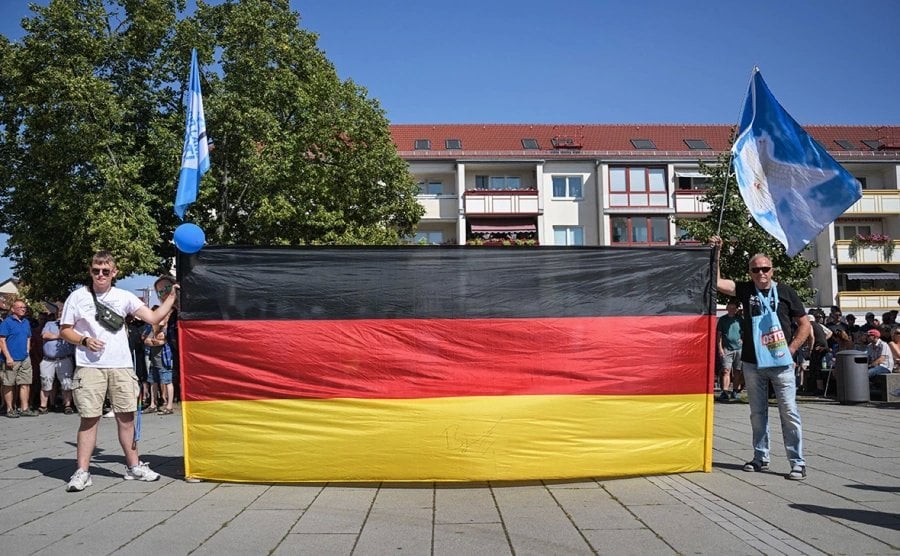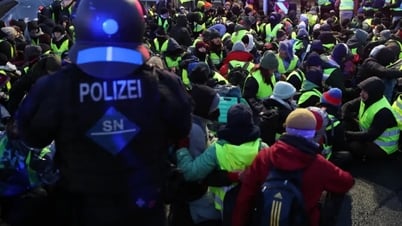A study by the National Institute of Applied Sciences (INSA) on August 24 showed that in Saxony, 32% of respondents were willing to vote for the AfD and only 6% supported Chancellor Olaf Scholz's Social Democratic Party (SPD).
Coming in second is the opposition Christian Democratic Union (CDU) with 30% of the support, followed by the left-wing populist Sarah Wagenknecht Alliance (SSV) with 15%. According to the poll, the Green Party in the ruling coalition in Saxony received only 5%.
In Thuringia, the AfD also leads with 30%, while the SPD only receives 6% of the support and the Greens have 3%. The CDU and SSV are in a close second place with a fairly close ratio of 21% to 20%. Only in Brandenburg does the AfD compete for the lead with the SPD of Chancellor Olaf Scholz - 24% to 20%. Meanwhile, the CDU is expected to receive 19% of the vote, the SSV - 17%.

The Alternative for Germany (AfD) party's election campaign in Thuringen state. Photo: Global Look Press
A difficult problem for the ruling party in eastern Germany
Today, the population of western Germany is more than five times that of the east – 68 million versus 12.5 million. However, it is the regional elections in the eastern states that have long been a serious test for the ruling forces.
Local voters have traditionally been critical of the ruling coalition and supportive of the opposition, particularly the far-right AfD. The left-wing party is also popular in eastern Germany, where it is seen as the political successor to the Socialist Unity Party of Germany, also known as the Communist Party of East Germany.
After Russia launched a special military operation against Ukraine, internal political cracks began to appear in Germany - a number of the country's leading politicians, led by Sarah Wagenknecht, did not support Berlin's line of reducing relations with Moscow and condemned the supply of German weapons to Ukraine.
As a result, in January 2024, the SSV Alliance emerged. In the European Parliament elections in June, most left-wing voters voted for the SSV. If in the 2019 European elections, left-wing parties received 5.5%, this year - only 2.7%, while the SSV reached 6.2%.
Analysts say the main reason for the anti-government sentiment among people in eastern Germany is that inequality continues to be deep, and people here feel like “second-class citizens”. According to a study by the German Federal Statistical Office (Destatis), in 2023, people in the former East Germany will earn an average of 824 euros less per month than those in the former West Germany.
Meanwhile, residents in eastern Germany pay 22% more for electricity on average than in western Germany – 5,042 euros a year compared to 4,139 euros. The government explains this as a result of the large investments that energy companies make in expanding the grid and maintaining their operations.
German sociologist Detlef Pollack notes that nearly 30% of people in eastern Germany are skeptical of the ruling parties, and the upcoming elections will confirm this once again. “Dissatisfaction is beginning to characterize the people of the eastern lands. Their expectations of equalization of economic conditions have not been realized and they still consider themselves second-class citizens,” said expert Detlef Pollack.
The role of the Russia-Ukraine conflict.
Foreign policy issues have traditionally not played a key role in German elections, especially at the local level (local governments do not make decisions on defense policy). However, this time the Russia-Ukraine conflict has become a key issue in the election campaign in eastern Germany.
According to a study by the Allensbach Population Institute, 76% of respondents in the eastern states are concerned that Germany could be drawn into a military conflict (only 44% in the western states think so). While 75% of respondents nationwide see Russia as a threat, in eastern Germany this figure is 53%. At the same time, 40% of respondents in the eastern states see a threat from the United States, while 24% share this view nationwide.
These political differences are actively exploited by both the AfD and the SSV. Despite the fact that these parties are ideologically at opposite ends, they have consistently criticized the government for supplying weapons to Ukraine and supporting negotiations with Moscow.
As German state broadcaster ZDF notes, the AfD and SSV are “turning the local elections into a choice between war and peace.” The AfD representative in Thuringen, Bjorn Hecke, believes that “the elections in the east will decide whether the country abandons the path of war in the medium term or continues on the path of escalation.” “Peace” is also a key word in the SSV’s election campaigns in Thuringen, Saxony and Brandenburg.
According to Tagesspiegel, in addition to the AfD and SSV, representatives of the CDU and SPD parties also began discussing peace in Ukraine during the election campaign. The primary goal of these parties is to draw voters away from their opponents or even signal to Wagenknecht that they are ready to cooperate to prevent the AfD's victory. Recently, the Prime Minister of the German state of Saxony, Michael Kretschmer (a member of the CDU), called on Russia and Ukraine to sit down at the negotiating table.
In early August, Brandenburg State Premier Dietmar Woidke (SPD politician) emphasized that the Russia-Ukraine conflict has been going on for nearly 3 years and it is time for all sides to stop provocative actions that escalate tensions.
According to Dietmar Woidke, Germany can play a mediating role in this conflict. Meanwhile, Thuringian State Prime Minister Bodo Ramelov said that Europe needs a new security system that includes Russia; at the same time, he called on all countries to "sign a non-aggression pact and form a defense alliance focused on resolving conflicts in Europe".
How will the election affect German politics?
The ratings of the ruling forces at the federal level continue to decline; meanwhile, the next parliamentary elections are scheduled for September 2025. According to a study by the ZDF television station on August 15, 62% of Germans rate the government's performance negatively, while 33% rate it positively. Chancellor Olaf Scholz's activities were rated as unsuccessful by 58% of respondents.
However, according to the German newspaper TAZ, the lack of confidence in the SPD, the Free Democratic Party (FDP) and the Green Party in the east of the country is unlikely to lead to early parliamentary elections, although more and more Germans are expressing doubts about the governing capacity of the ruling coalition government.
On the contrary, Der Spiegel journalists believe that if the SPD fails to win seats in the Thuringia and Saxony parliaments, the activities of Chancellor Olaf Scholz will inevitably be affected. The publication recounts that after the SPD lost the 2005 regional elections in North Rhine-Westphalia, then-Chancellor Gerhard Schröder called on the Bundestag to pass a vote of no confidence in him and call for early federal elections. As a result, in the fall of that year, the post of head of government passed to Angela Merkel, representing the CDU.
Ha Anh
Source: https://www.congluan.vn/dang-cuc-huu-len-ngoi-o-mien-dong-nuoc-duc-lien-minh-cam-quyen-gap-kho-post309609.html



![[Photo] Keep your warehouse safe in all situations](https://vphoto.vietnam.vn/thumb/1200x675/vietnam/resource/IMAGE/2025/10/1/3eb4eceafe68497989865e7faa4e4d0e)

![[Photo] Hanoi morning of October 1: Prolonged flooding, people wade to work](https://vphoto.vietnam.vn/thumb/1200x675/vietnam/resource/IMAGE/2025/10/1/189be28938e3493fa26b2938efa2059e)

![[Photo] President of the Cuban National Assembly visits President Ho Chi Minh's Mausoleum](https://vphoto.vietnam.vn/thumb/1200x675/vietnam/resource/IMAGE/2025/10/1/39f1142310fc4dae9e3de4fcc9ac2ed0)





























































































Comment (0)